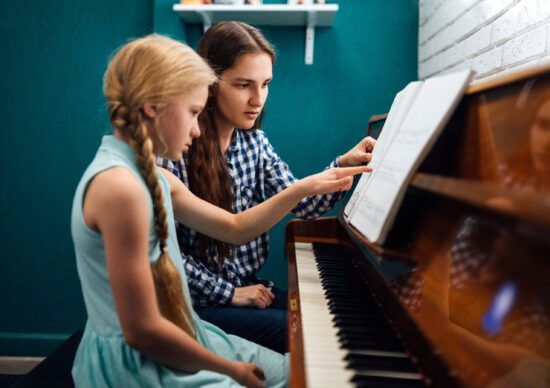Piano tutoring isn’t just about pressing keys to create beautiful melodies; it’s an educational journey that can significantly impact your child’s cognitive, emotional, and social development. So, let’s dive into some key areas where piano tutoring can make a real difference.
Boosting Cognitive Development
Sharper Memory Skills– Learning piano involves memorizing notes, rhythms, and melodies. This constant exercise enhances your child’s memory and cognitive abilities.
Enhanced Problem-Solving– Reading sheet music and deciphering musical notations are like solving puzzles. This can sharpen your child’s problem-solving skills as they figure out how to play a piece effectively.
Improved Concentration– Piano requires intense concentration since both hands are engaged independently. This heightened focus can spill over into other aspects of your child’s life, improving their concentration in school and daily tasks.
Mathematical Skills– The rhythm and timing in music have close ties to mathematics. Through piano tutoring, children naturally develop a sense of timing and mathematical abilities, which can be advantageous in subjects like math and science.
Fostering Emotional Growth
Stress Relief– Playing the piano provides a creative outlet for emotional expression. It’s a soothing and calming activity that helps your child manage stress and anxiety.
Boosted Confidence– As your child progresses in their piano skills, they gain a sense of accomplishment and self-confidence. This newfound self-assurance can translate to other areas of their life, making them more willing to tackle challenges.
Self-Discipline– Consistent practice is a must in piano learning. This instills discipline in your child, teaching them the value of setting goals, working diligently, and reaping the rewards of their efforts.
Nurturing Social Development
Collaboration and Teamwork– Piano students often participate in group recitals or ensemble performances. This fosters collaboration, teamwork, and the ability to work harmoniously with others.
Communication Skills– Playing the piano allows your child to communicate their emotions and ideas through music. This form of expression can enhance their overall communication skills, making it easier for them to convey their thoughts and feelings.
Cultural Awareness– Music exposes children to diverse cultures and styles. Learning different musical genres broadens their horizons and encourages an appreciation for cultural diversity.
Time Management– Balancing piano practice with other commitments teaches your child valuable time management skills, a crucial aspect of their future success.
The Advantages of Professional Piano Tutoring
While some children may dabble with the piano on their own, enrolling them in professional piano tutoring can amplify the benefits. Here’s why-
Structured Learning– Professional piano tutors provide a well-organized curriculum tailored to your child’s age and skill level. This ensures steady progress and minimizes frustration.
Personalized Guidance– A piano tutor can identify your child’s strengths and weaknesses, offering personalized guidance to address specific challenges.
Motivation and Accountability– Regular lessons and a tutor to report to keep your child motivated and accountable for their practice, ensuring consistent progress.
Access to Resources– Professional tutors have a wealth of resources, including sheet music, practice exercises, and performance opportunities, enriching your child’s learning experience.
Investing in your child’s development through piano tutoring is an investment in their overall growth and well-being. So, if you’ve been contemplating whether piano lessons are right for your child, consider the multitude of benefits they can gain from this timeless and harmonious journey. Give your child the gift of music and watch them flourish into well-rounded individuals, ready to conquer life’s challenges with confidence and grace.









